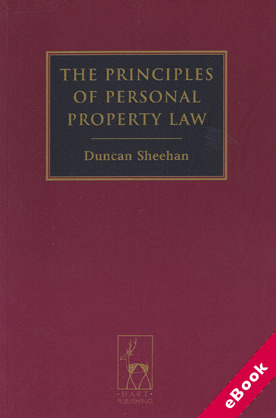
The device(s) you use to access the eBook content must be authorized with an Adobe ID before you download the product otherwise it will fail to register correctly.
For further information see https://www.wildy.com/ebook-formats
Once the order is confirmed an automated e-mail will be sent to you to allow you to download the eBook.
All eBooks are supplied firm sale and cannot be returned. If you believe there is a fault with your eBook then contact us on ebooks@wildy.com and we will help in resolving the issue. This does not affect your statutory rights.
The law of personal property covers a very wide spectrum of scenarios and has had little detailed scrutiny of its overarching structure over the years. This is a shame. It is a system and can best be understood as a system. Indeed without understanding it as a system, it becomes much more difficult to understand. This new textbook is intended to provide a comprehensive and yet detailed coverage of the subject. It includes transfer of legal title to chattels, the nemo dat rule, negotiable instruments and assignment of choses in action. It also looks at defective transfers of property and the resulting proprietary claims, including those contingent on tracing, the tort of conversion, bailment and security interests. By bringing together areas often scattered throughout company law, commercial law, trusts and tort textbooks it enables readers to see common themes and issues and to make otherwise impossible generalisations across different contexts about the nature of the concepts English law applies. Throughout the book, concepts are explained rigorously, with reference to how they are used in commercial practice and everyday life.
The book will be of use to students on undergraduate commercial law courses, or related LLM courses, as well those as on integrated property law courses, and particularly specialised personal property modules. It will also be useful to academics and practitioners working in the area.